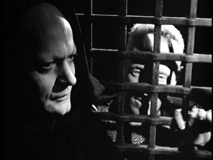Remarks suggested by the previous post —
|
From Jeremy Biles, "Introduction: The Sacred Monster," in (Fordham University Press, 2007, page 3) — Bataille’s insistent conjunction of the monstrous and the sacred is the subject of this book. Regarded by many as one of the most important thinkers of our time, and acknowledged as an important influence by such intellectuals as Michel Foucault, Julia Kristeva, Maurice Blanchot, and Jacques Derrida, Bataille produced a corpus of wide-ranging writings bearing the monstrous marks of the affective and intellectual contradictions he also sought to produce in his readers. In the following chapters, I will specify some of the ways in which Bataille evokes monstrosity to elicit in himself and his audience an experience of simultaneous anguish and joy—an experience that he calls sacred. In particular, Bataille is fascinated with the ‘‘left-hand’’ sacred. In contradistinction to its lucent and form-conferring ‘‘right-hand’’ counterpart, the left-hand sacred is obscure and formless—not transcendent, pure, and beneficent, but dangerous, filthy, and morbid. This sinister, deadly aspect of the sacred is at once embodied in, and communicated by, the monster. As we will see, it is in beholding the monster that one might experience the combination of ecstasy and horror that characterizes Bataille ’s notion of the sacred. The dual etymology of ‘‘monster’’ reveals that aspect of the sacred that enticed Bataille. According to one vein of etymological study, the Latin monstrum derives from monstrare (to show or display). The monster is that which appears before our eyes as a sign of sorts; it is a demonstration. But another tradition emphasizes a more ominous point. Deriving from monere (to warn), the monster is a divine omen, a portent; it heralds something that yet remains unexpected, unforeseeable—as a sudden reversal of fortune. In the writings of Bataille, the monster functions as a monstrance, putting on display the sinister aspect of the sacred that Bataille sees as the key to a ‘‘sovereign’’ existence. But in doing so the monster presents us with a portent of something that we cannot precisely foresee, but something that, Bataille claims, can be paradoxically experienced in moments of simultaneous anguish and ecstasy: death. |
See as well …
(Order of news items transposed for aesthetic effect.)





 leads an esoteric, special existence beyond the fringe of what is generally acknowledged to be the academic world.”
leads an esoteric, special existence beyond the fringe of what is generally acknowledged to be the academic world.”